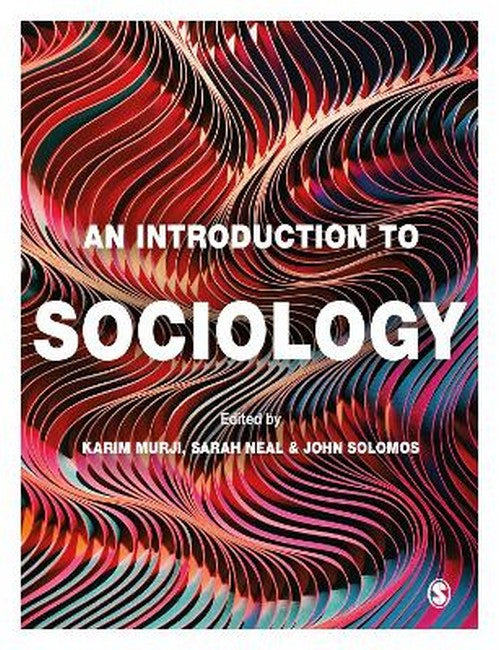Karim Murji is Professor of Social Policy at the University of West London. His research and publications cover areas such as racism, race equality and social policy, migration, and policing. With John Solomos and others, he is currently working on an ESRC-funded project on the Open City, which investigates how the city accommodates new forms of urban life, through the social reconfiguration of its spaces and places, and looks at the ways urban government at the city-wide and borough scales reflect, promote or limit the idea of the open city, using London as a case study. With Sarah Neal he is the Editor of Current Sociology, and they were previously the editors of Sociology. Sarah Neal is a Professor of Sociology at the University of Sheffield. Sarah researches and writes in the fields of race, ethnicity, multiculture, community, belonging, and place. Recent publications include The Lived Experience of Multiculture: The New Spatial and Social Relations of Diversity (Routledge, 2018, with K. Bennett, A. Cochrane and G. Mohan) and Friendship and Diversity: Ethnic and Social Relations in the City (Palgrave Macmillan, 2018, with Carol Vincent and Humera Iqbal). She is the coeditor of Current Sociology and an editorial board member of Ethnic and Racial Studies John Solomos is a professor of Sociology at the University of Warwick. His teaching is focused on the sociology of race and racism, sociological theory, human rights and social theory, qualitative research methods and multiculturalism and citizenship. He has supervised a wide range of PhD students in both his own areas of research interest and in other fields of sociology. He welcomes the opportunity to work with PhD students and is interested to receive informal inquiries from prospective research students. He is currently supervising students working on a range of issues, including migration and refugees, minority families and social capital, Turkish-speaking youth in London and Cuban music and popular culture. He serves on the Strategic Research Board of the Economic and Social Research Council. He is also joint editor with Martin Bulmer of the international journal Ethnic and Racial Studies, published 12 times a year by Routledge.
Request Academic Copy
Please copy the ISBN for submitting review copy form
Description
Part One Thinking Sociologically Introduction to Part One Chapter 1 Approaching Sociology Chapter 2 What is Sociological about the Digital Society? Chapter 3 What is Sociological about the Environment? Chapter 4 What is Sociological about Crime? Chapter 5 What is Society? Chapter 6 Sociology of an Interconnected World Part Two Theories and Methods Introduction to Part Two Chapter 7 Classical Sociologies Chapter 8 Contemporary Social Theory Chapter 9 Beyond the Qualitative/Quantitative Divide Chapter 10 Visual and Digital Methods of Research Part Three Inequalities and Identities Introduction to Part Three Chapter 11 Class Chapter 12 Gender Chapter 13 Race Chapter 14 Age Part Four Connecting the Personal and the Social Introduction to Part Four Chapter 15 Families and Households Chapter 16 Intimacies, and Relationships Chapter 17 Work Chapter 18 Health Chapter 19 Education Chapter 20 Religion Part Five Sociological Frontiers Introduction to Part Five Chapter 21 Cultures and Consumption Chapter 22 War and Violence Chapter 23 Science and Technology Chapter 24 Migrations Chapter 25 Social Movements Part Six What is Sociology Useful For? Introduction to Part Six Chapter 26 Sociology as a Science? Chapter 27 Public Sociology Chapter 28 Using Sociology
Each chapter of this particularly comprehensive and thoughtful Introduction to Sociology has the great virtue of being written by a particularly knowledgeable expert able to convey what it means to approach a topic sociologically. The book provides a perfect foundation for the first years of study for students who want to understand social reality through more complex and accurate analytical lenses. As such, it is an essential tool for undergraduate intellectual development. -- Professor Michele Lamont An Introduction to Sociology provides new and up to date insights into persistent social issues. Through its 28 chapters, the volume covers topics ranging from digital society and the environment to migration and employment. Material is presented in an accessible format that will appeal to a wide range of readers from A-Level to undergraduates and will be a useful, practical teaching resource for lectures. -- Louise Ryan This superb introduction to sociological thinking and research covers a rich variety of themes and approaches. In a multifaceted way and with timely examples, it introduces both classical sociological research fields, such as working life and criminology, and rapidly developing fields of study on digital society and environmental sociology. Its up-to-date focus on decolonial and global perspectives, and intersectional perspectives on race, gender and class make it essential reading for new sociology students and inspiration to lecturers teaching sociology courses. -- Suvi Keskinen

